From the moment they walk through the gates until they board their plane, passengers passing through the country’s busiest airport are entitled to service in French. But in the context of difficult hiring, Pearson Airport has a policy that, according to one lawyer, conflicts with the principles of the Official Languages Act.
On December 12, Radio-Canada visited dozens of restaurants at the airport. None of them were able to provide service in French.
Most restaurateurs did not even know Molière’s language. what language do you speak?
For example, a café manager asked.
But the law on official languages is clear. It is the responsibility of federal institutions to ensure this […] Organizational services provided to travelers by third parties approved by them for this purpose, in both official languages
we can read in federal law.
These regulatory services include those provided by restaurants, car rental agencies, currency exchange offices and duty-free shops.
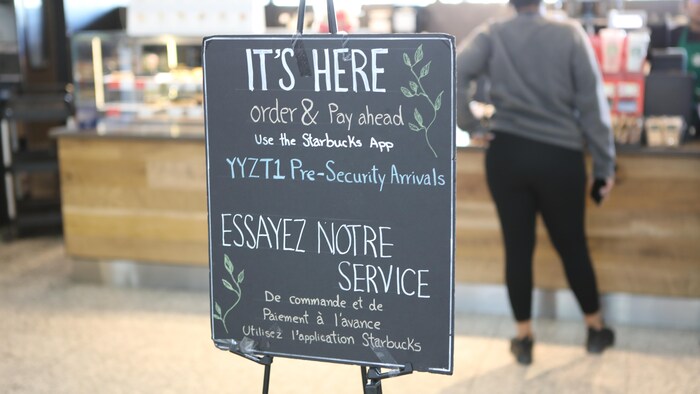
The leases that Pearson Airport’s director signs with restaurant owners require bilingual signage.
Photo: Radio-Canada/Yannick Lepage
In response to a recent complaint filed with the Office of the Official Languages Commissioner, the director of Pearson Airport confirmed that restaurant owners’ leases require them to Make an active offer of bilingual service and provide services covered by the law in both official languages
.
What is active display?
The active offer of service is an invitation to the public to use one of the two official Canadian languages: French or English. The active display includes a bilingual welcome, e.g Hello Hello
.
In a memo sent to Radio-Canada, the Greater Toronto Airports Authority (GTAA) explains its expectations of its merchants.
If the person is unable to provide this service [en français]retailers are required to provide the service with access to the real-time translation application 24/7
“, writes Karen Mazurkiewicz, Vice President of Stakeholder Relations and Communications at GTAA.
During Radio-Canada’s visit to Pearson Airport, employees of only two restaurants indicated they used the telephone interpretation service. Two other institutions reported using instant translation tools available on smartphones.
SSP Group, which owns several Toronto Airport restaurants, says via email that when no employee speaks French, employees should call a central phone line so a manager can take the order or request assistance from a manager for the unit.
But these practices do not respect the principle of true equality enshrined in the Official Languages Law, according to Gabriel Poliquin, an expert lawyer in linguistic law.
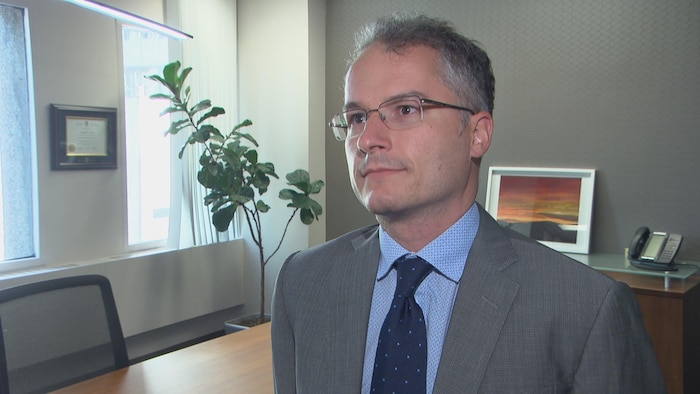
Lawyer Gabriel Poliquin believes that the use of simultaneous translation contravenes the Official Languages Law. (archive photo)
Photo: Radio-Canada
An English speaking customer is never put in this position where they have to call a phone number to be served in the official language of their choice. This puts customers who request services in French at a disadvantage.
“, explains the lawyer.
there GTAA It did not respond to our interview requests or answer our questions about the use of its translation service by its restaurants. Radio-Canada was unable to obtain interviews with the companies that own the restaurants visited.
Despite everything, Me Poliquin understands that the challenges of hiring bilingual employees in environments where French is a minority language puts federal institutions in a difficult position. The situation is very difficult
.
I am looking for bilingual candidates
In its latest annual report (A new window)The Commissioner of Official Languages reported that the country’s airport authorities are facing difficulties in bilingual recruitment, which partly explains the increase in the number of complaints submitted by travelers who were unable to obtain service in French.
In an interview, Raymond Theberge emphasized that this is an issue that affects… Almost all federal institutions
. The latter preferred not to comment on Pearson Airport’s policy as investigations are ongoing into complaints targeting the institution.
According to Greg Benadeba, president of recruitment firm Source Bilingue, between 10 and 15 per cent of jobs posted in Toronto target candidates who speak both French and English. Thus, companies compete for the small number of workers who have the required language skills.
It’s a big problem. The demand for bilingual people is certainly greater than the pool of candidates
confirms Mr. Benadiba.
He explains that he has to make great efforts to fill certain positions. The recruiter also tells his clients to expect a 20 to 40% higher salary for a bilingual candidate.
We need to do real recruiting. Simply place an ad on LinkedIn or… actuallyIt’s not enough
He explains.
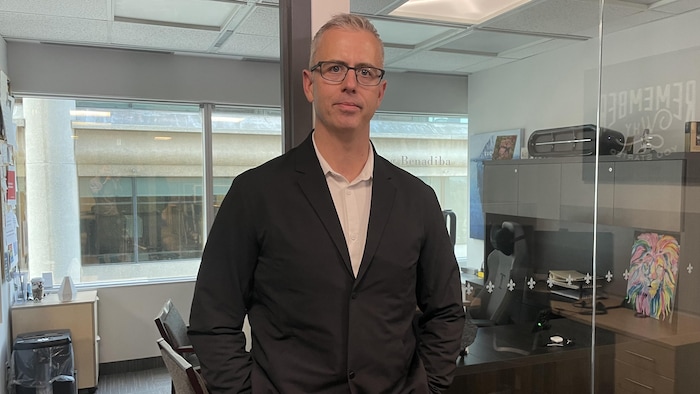
Greg Benadeba is president of Source Bilingue, a bilingual staffing firm in Toronto.
Photo: Radio-Canada/Yannick Lepage
Bilingual candidates still need to know that they are in demand. Of the dozens of positions posted online by Pearson Airport restaurant owners earlier this week, Radio-Canada could find none that listed knowledge of French as a required or desirable skill.
there GTAA He did not respond to our questions in this regard.
Lack of effort or impossible task?
Despite the challenges, Benadeba insists that Pearson has the capacity to meet her language requirements.
But it must be required and must [faire] efforts
It’s the nuances.
The recruitment expert believes that to achieve this, the airport manager must cooperate with French-speaking organizations in the region, continue promoting job offers for bilingual workers and use the services of professional recruitment companies if necessary.
Mai Polikin, a lawyer in linguistic law, believes that we must above all increase the number of bilingual people in the country, otherwise federal institutions will always struggle to comply with their language requirements.
He particularly highlights the importance of French immersion programs, which, due to their popularity, do not always succeed in recruiting enough teachers.
To this end, the lawyer points to encouraging signs in the recent reform of the Official Languages Act. Ottawa in particular has committed to this Protecting and promoting the French language
Which could force the government to fund more Frenchization programs, according to Mai Poliquin.
The reform also grants greater powers to the Commissioner of Official Languages. The latter may, among other things, impose Administrative financial penalties
Up to $25,000 for organizations that do not comply with the law.
This will lead to better compliance by federal institutions
Commissioner Theberge hopes.
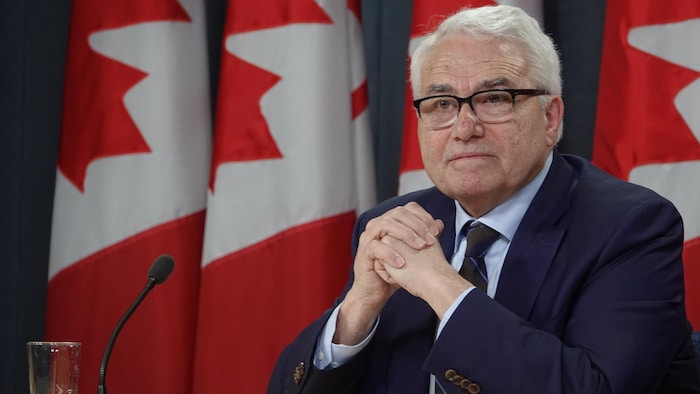
Official Languages Commissioner, Raymond Theberge (archive photo)
Photo: Radio-Canada/Angie Bonenfant
In addition to increasing the number of bilingual workers, this compliance requires, he says, through training, a preferred method in the public service, in particular.
For now, federal agencies, including airports, are instead focusing on another solution: technologies.
Technologies are not a The effective solution
warns the commissioner
Ten years ago we believed that the use of digital technologies would allow federal institutions to fill some of the gaps in official languages, for example, automating certain processes to compensate for their lack of bilingual resources.
We can read in the latest annual report of the Commissioner of Official Languages.
It must be recognized that this vision has not yet been fully realized.
he added.
However, in an interview, he expressed doubts about the ability of technological tools to ensure the provision of services in French.
You have to pay attention to technology […] This is not a miracle solution.
This is because federal institutions cannot rely solely on technologies to fulfill their language obligations, Mr. Poliquin emphasizes.
ICI Ontario Bulletin
Subscribe to the ICI Ontario newsletter.
If technology is not available, someone must be there to help [les clients]He explains. If there was no one to provide assistance in French, it would be a violation of the Official Languages Act.
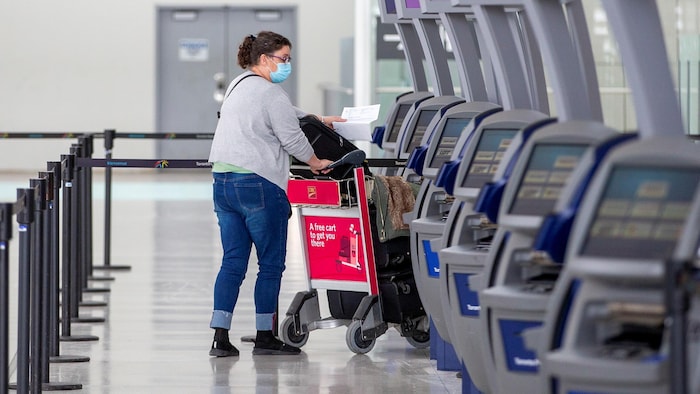
Boarding pass stations are an example of technological tools used in the transportation sector. (archive photo)
Photography: Reuters/Carlos Osorio
He also points out that technical problems or staffing difficulties do not constitute an acceptable legal defense for an organization not complying with the law, which Commissioner Theberge agrees with.
It is always up to the federal institution to provide itself with the necessary means to fulfill its obligations regarding official languages.
He says.
It really comes down to the culture within the organization. If one wants […] To provide the best possible service, which includes service in French, and I believe we will take the necessary means to do so
The commissioner adds.
there GTAA It says it is making efforts to provide bilingual service to the tens of millions of travelers who visit Pearson Airport each year.

“Amateur entrepreneur. Professional internet expert. Zombie maven. Incurable pop culture scholar.”





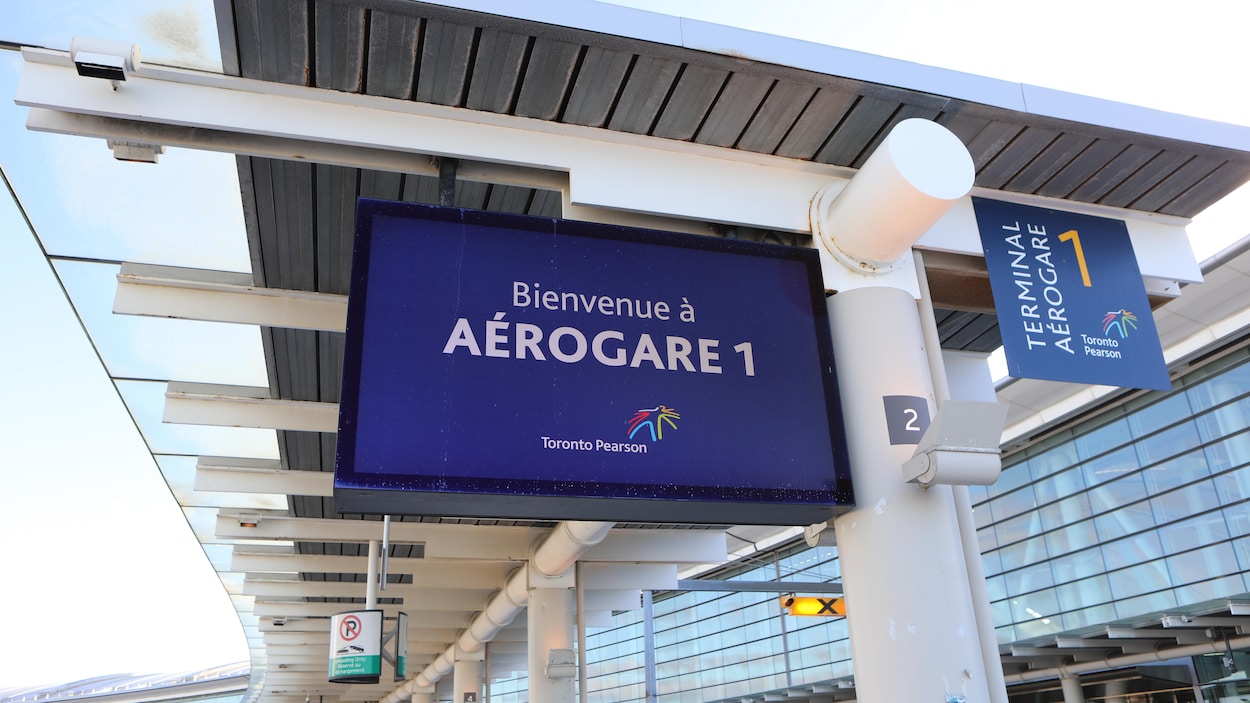
More Stories
You've spent your evenings watching “Criminal Minds,” if you can name these five characters
Charged with throwing a tarantula at a tenant
After The Walking Dead, Andrew Lincoln has landed a role in an “exciting” new series.